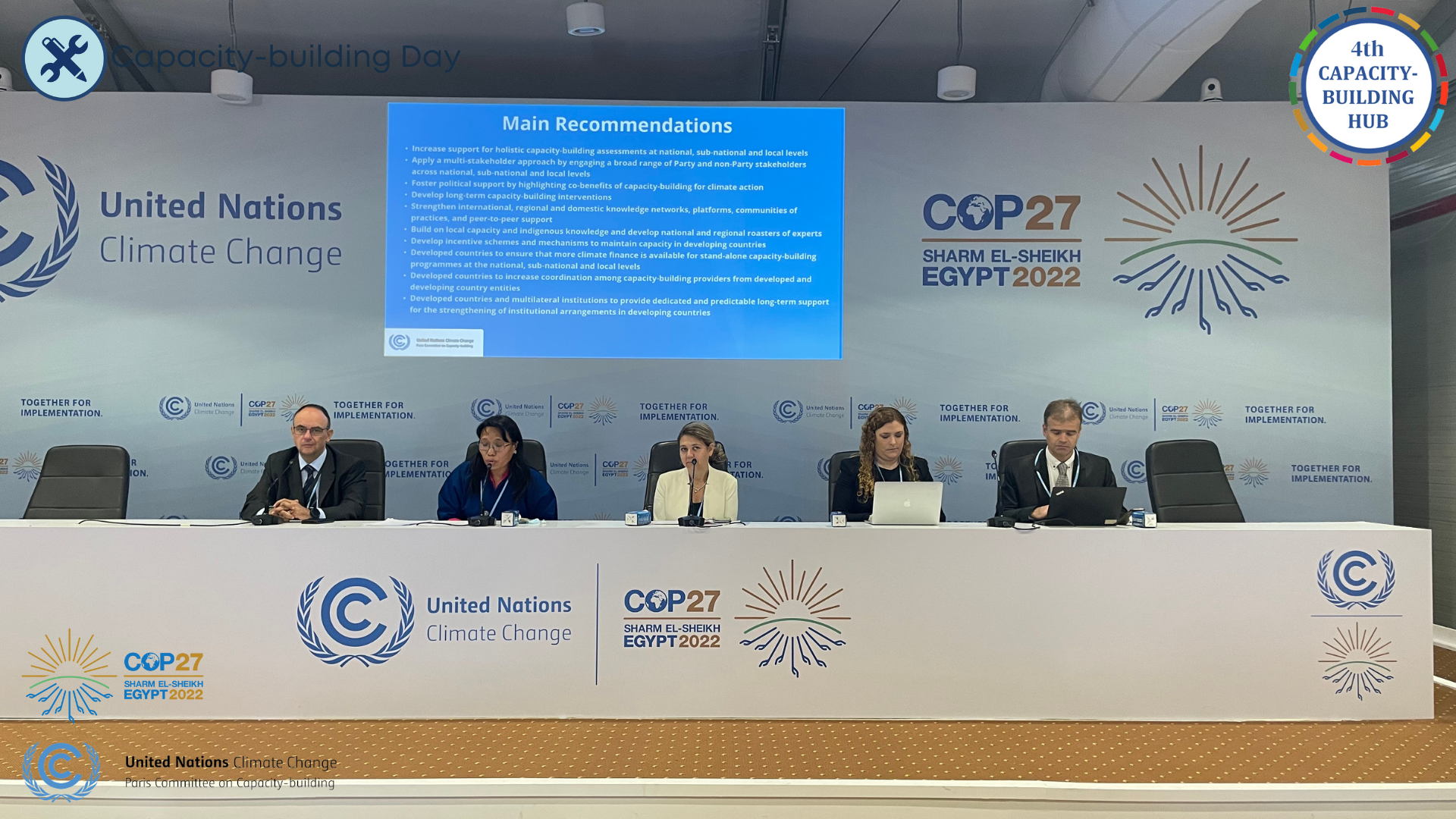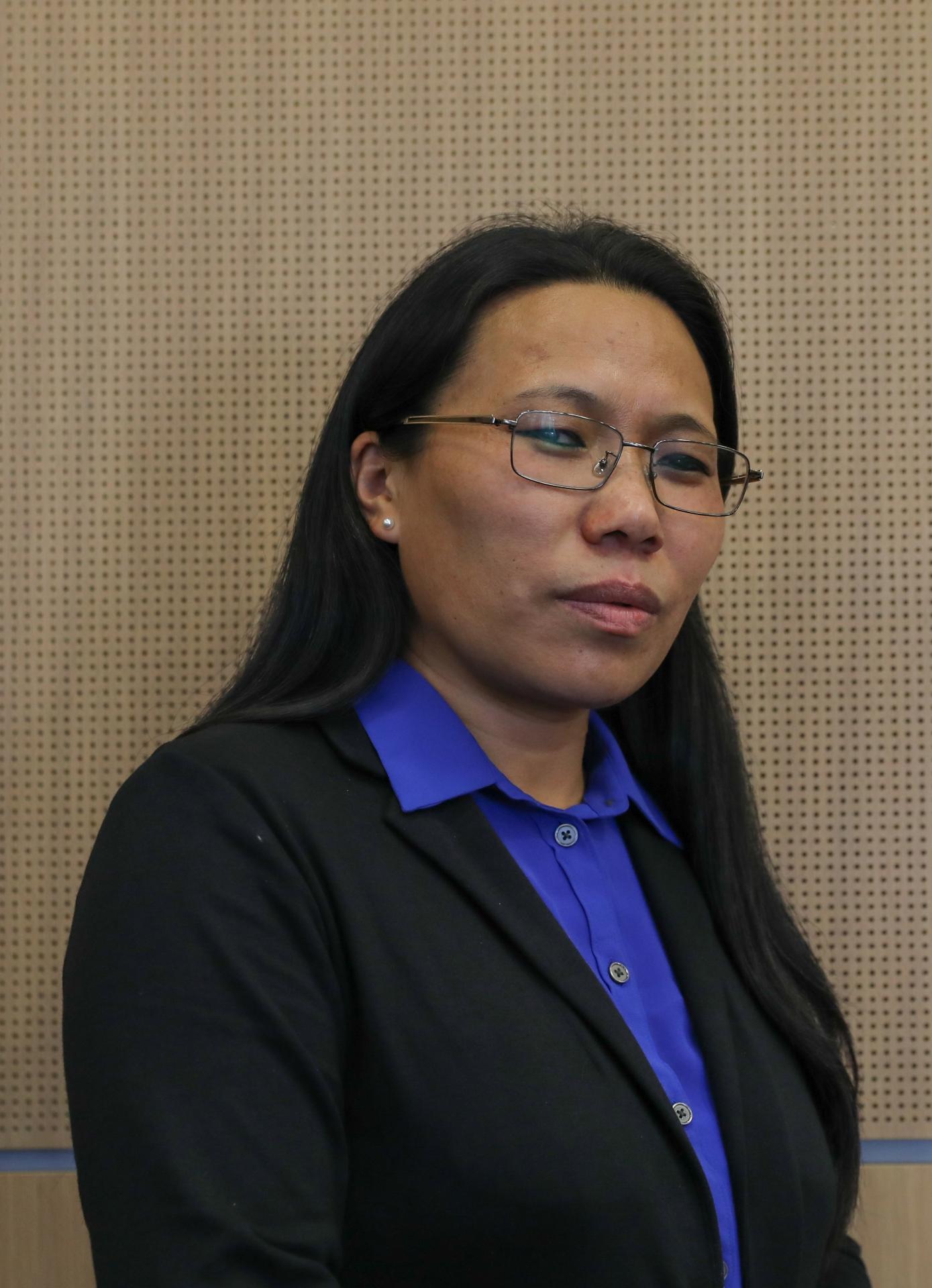Please find the PCCB Focus Area Day outcomes article here.
Event Recording
Organizer
Background
Capacity-building is one of the means of implementation under the Convention and the Paris Agreement (next to finance and technology) and central to achieving their objectives. Developing countries, in particular least developed countries (LDCs) and small island developing States (SIDS), need to urgently enhance and find ways to maintain adequate systemic, institutional and individual capacities to carry out climate change adaptation and mitigation actions at large. This requires the development of endogenous capacity, meaning capacity that is locally and nationally owned and that ultimately can be maintained and enhanced independent from international support. The Paris Agreement, in its Article 11.2, provides a universal consensus that capacity-building for climate action “should foster country ownership … at the national, subnational and local levels”, while being “country-driven, based on and responsive to national needs”. Country-owned capacity-building does not start with the capacity-building intervention, but also implies a shift of the assessment of capacity gaps and needs to the national and local level, where the understanding of existing and emerging needs, challenges and strengths is greatest.
The mission of the Paris Committee on Capacity-building (PCCB) is to identify capacity gaps and needs and potential solutions, including enhancing the coherence and coordination of capacity-building efforts related to climate change. Through its activities and technical products, the PCCB aims to support long-term capacity-building that is based on developing country ownership and local leadership of the process, as well on the needs and priorities at country and local level. Across its work the PCCB fosters collaboration between actors at all levels, with a view to strengthening networks and partnerships to enhance synergies and promote knowledge- and experience-sharing.
Objectives
During this session, the PCCB launched its new technical paper on enhancing the ownership of developing countries of building and maintaining capacity for climate action and presented its recently published PCCB toolkit to assess capacity gaps and needs to implement the Paris Agreement to a wide audience.
The session contributed to the ongoing discussion on how country ownership of capacity-building can be better ensured. It provided concrete insights on key challenges, experience, good practices and lessons learned in this regard and on concrete tools to assist developing countries in assessing their own capacity gaps and needs. The role of networks in supporting country-owned capacity building and capacity gaps and needs assessments was also addressed.
Structure
| Time |
Segment and Speakers |
|
5 min
|
Opening remarks
|
|
15 min
|
Presentation of the findings from the technical paper and introduction of the PCCB toolkit
|
| 5 min |
Insights from undertaking a capacity gaps and needs assessment
- Mahawan Karuniasa, Chairman, Indonesia Expert Network on Climate Change and Forestry
|
| 45 min |
Panel responses and discussion with the audience, moderated by PCCB
-
Pilar Bueno Rubial, Impulsouth
-
Juan Casado Asensio, Organisation for Economic Co-operation and Development (OECD)
|
| 5 min |
Conclusions
- Roberta Ianna, PCCB
- Michal Nekvasil, Czech Presidency of the Council of the EU
|
Speakers
|
|
Roberta Ianna is currently serving as Co-Chair of the Paris Committee on Capacity-building (PCCB) and is a senior expert at the Italian Ministry of Ecological Transition. |
|
|
Kunzang is an adviser to the National Environment Commission, Royal Government of Bhutan. She has a Masters in Environmental Management from Yale University. At UNFCCC negotiations, she negotiates the capacity building agenda for LDCs. She is also a member of PCCB and leads the committee’s working group on identifying and addressing capacity gaps and needs. At COP24, she negotiated the Global stocktake agenda for the LDCs and co- facilitated the Compliance Committee agenda at COP26. At COP27, she will be also co facilitating the Compliance Committee agendas under PA and KP.
|
|
|
Mahawan Karuniasa is a former member of the Paris Committee on Capacity Building. Besides as a founding members of Asia Climate Experts group, he is a chairman of the Indonesia Expert Network on Climate Change and Forestry since 2017. Currently Mahawan is a lecturer at the School of Environmental Science, University of Indonesia and CEO of Environment Institute, an independent organization focuses on climate change and sustainability issues. |
|
|
Dr. Pilar Bueno Rubial is a Senior Researcher at the National Council of Scientific and Technical Research (CONICET) of Argentina. Former member and co-chair of the UNFCCC Adaptation Committee and former Secretary of Climate Change of Argentina. She negotiated adaptation for Argentina at the UNFCCC and was leading coordinator of the G77 and China on adaptation. She currently leads the Project Argentina 1.5ºC, as well as the Center of Studies in Environmental Policies of the National University of Rosario (UNR) and the Department of Environment and Development of the National University of La Plata. She is the Academic Coordinator of the Diploma in Political Management of Climate Change in Latin America and the Caribbean (UNR) and current Undersecretary of Climate Change and Just Ecological Transition of the city of Rosario, Argentina. |
|
|
Michal Nekvasil received his PhD. degree in ´Environmental Studies´ at the Charles University, Czechia. He has been working on climate-related issues for more than 20 years. Mr. Nekvasil has been working for the European Commission since 2003: Directorate General for the Environment, EU Delegation to Georgia, EU Delegation to Nicaragua and Central America, and lately at the Directorate General for Climate Action. During his sabbatical leave, he worked for People in Need, World Bank, UNDP, UNEP, Czech Development Agency and other organizations as a free-lance climate expert. Mr. Nekvasil has been temporarily seconded by the European Commission to the Czech EU Presidency for the second semester of 2022. Besides others, he has been dealing with capacity building issues in developing countries. |
|
|
Juan Casado-Asensio, joined the Development Co-operation Directorate in September 2013, where he works on climate change, biodiversity and development co-operation. He currently leads a project on capacity development for climate change and on biodiversity-related development finance. Previously, he managed the relations with countries that are not members of the OECD Development Assistance Committee, in particular Arab donors, Central Asia, Turkey and Eastern Europe. Before joining the OECD, Juan was a post-doctoral researcher and lecturer on sustainable development and climate change at the Institute of Forest, Environmental and Natural Resource Policy of the University of Natural Resources and Life Sciences (BOKU) in Vienna (2011-13). Juan has also researched and lectured on political representation and qualitative and quantitative research methodsat the University of Vienna and the Austrian Academy of Sciences (2007-10). He also worked for the United Nations Industrial Development Organisation (2003-04) and the European Commission (2007). Juan earned a PhD in political science from the Universtiy of Vienna in 2008, a Master in Economics from the Universidad Nacional de Educación a Distancia (UNED, 2012), a Master in International Affairs from the Vienna Diplomatic School (2004), and a Bachelor in Economics (2002) from the London School of Economics. He has over 30 peer-reviewed publications in OECD and academic outlets, including Climate Policy, Natural Resources Forum, Policy Sciences, Journal of Public Policy and Comparative European Politics.
|
Key Outcomes
- The technical paper and the toolkit of the PCCB to assess capacity-building needs and gaps provide great potential for developing countries in identifying their capacity gaps and needs relating to climate change and how to maintain their capacities.
- For donors the tools provided can help to navigate in capacity-building landscape and its activities.
- The usage of the assessment tools by the relevant stakeholders can be improved by further dissemination. Promoting the toolkit and the technical paper on events like the COP, as well as through regional events will be necessary to raise awareness for risks of not using tools to assess activities effectiveness. Additionally, translation into more languages is needed to make them more accessible.
- Networks, like the PCCB Network, enable us to share capacity-building activities with relevant stakeholders. Also, network events have helped to raise awareness and keep the topic of capacity-building as a priority on the agendas.
- A lack of capacities can be the reason for unsuccessful policies in developing countries. Concrete projects and their sustainability are needed on a national level. To enhance capacity, one needs to know what the needs and gaps are. The toolkit can really help to assess these needs and gaps efficiently.









